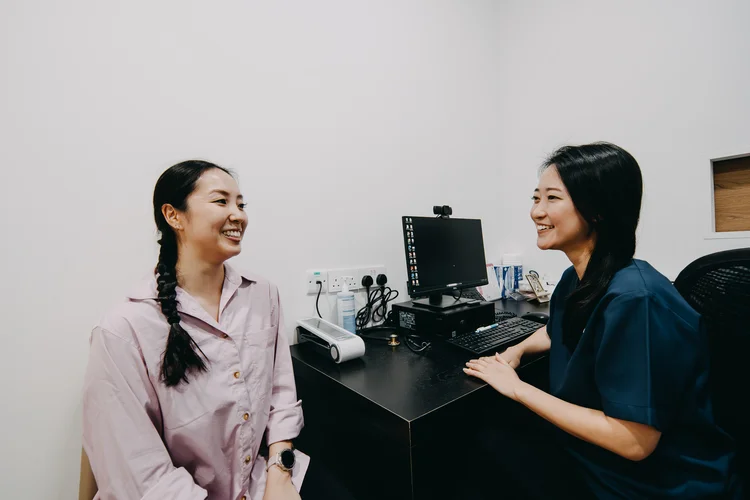What Is Andropause?
Andropause, also known as late-onset hypogonadism,
is the gradual reduction in testosterone levels that occurs as men
age. This condition is marked by a variety of physical,
emotional, and psychological changes. Although it is often
compared to menopause in women,
andropause develops more slowly and presents a wider range of symptoms.
Testosterone is the hormone
responsible for male characteristics such as muscle development, bone
strength, and sexual drive. A health screening
conducted in Singapore from 2007 to 2009 on 1,000 men revealed that 26.4%
had low testosterone levels. Recognising the symptoms early and getting
tested promptly is vital, as early intervention and treatment can
greatly enhance one's quality of life and overall well-being.

Causes of Andropause
The primary cause of andropause is the natural decrease in testosterone that comes with ageing. Testosterone levels typically begin to decline by about 1% each year after the age of 40, with most men experiencing symptoms in their 50s. However, certain medical conditions, such as testicular cancer or the surgical removal of the testes, can lead to an earlier onset of andropause. Additionally, men undergoing anti-testosterone therapy for prostate cancer may also experience symptoms.

Symptoms of Andropause
Common symptoms of andropause include:
- Fatigue and lower energy levels
- Reduced libido and erectile dysfunction
- Mood swings, depression, and irritability
- Hot flashes or night sweats
- Decreased muscle mass and strength
- Increased abdominal fat
- Sleep problems, including insomnia
It's important to note that these symptoms can be caused by other conditions, and not all men with low testosterone will experience them. If you notice these signs, it's important to consult a doctor for an accurate diagnosis and appropriate treatment.

Diagnosis of Andropause
Diagnosing andropause involves a comprehensive assessment of symptoms and
medical history, along with blood tests to measure testosterone levels. Your
doctor may also recommend additional tests to rule out other conditions that
might cause similar symptoms. A diagnosis is confirmed when low testosterone
levels are detected and other potential causes have been excluded.
Our healthcare clinic provides testing for
testosterone levels:
| Test | Price |
|---|---|
| Consultation | From $49.05 |
| Total Testosterone1 | $38.15 |
| Total Testosterone + Free Testosterone1 | $147.15 |
| Comprehensive Deficiency / Hair Loss Screen (Folate, Vitamin B12, Vitamin D, Iron, Total Iron Binding Capacity, % Iron Saturation, Ferritin, Zinc, Magnesium, Free T4, TSH) | $263.78 |
| Men Wellness (Full Body Screening + Total Testosterone)2 | From $152.60 |
*Prices are NETT and inclusive of GST.
^Prices last updated on
Jan 28, 2026. While every effort is made to keep pricing information up to date, please contact our team to confirm the latest rates.
1. Fasting and testing early in the morning is recommended for accuracy.
2. Fasting and testing early in the morning is required for accuracy

Andropause Treatment
Treatment for andropause focuses on alleviating symptoms and enhancing quality of life, which may involve:
- Testosterone Replacement Therapy (TRT): TRT is used to restore hormone levels and can be administered through injections, patches, or gels.
- Lifestyle Changes: Regular exercise, a balanced diet, effective stress management, and sufficient sleep are essential.
- Counselling and Support: Psychological support can help address emotional and mental health concerns, such as depression and anxiety related to andropause.
We also provide Testosterone Replacement Therapy (TRT) with the following pricing:
| Test | Price |
|---|---|
| Consultation | From $49.05 |
| Testosterone Injection | $381.50/injection |
| Testosterone Gel | $196.20/box |
*Prices are NETT and inclusive of GST.
^Prices last updated on
Jan 28, 2026. While every effort is made to keep pricing information up to date, please contact our team to confirm the latest rates.
Summary
Andropause can have a profound effect on a man's quality of life and the well-being of those around him. Early recognition of symptoms and timely medical consultation are vital for effective management. Regular health check-ups and open communication with your doctor can help you navigate and address any concerns. If you're experiencing symptoms of andropause, make an appointment to consult with a doctor for evaluation and treatment.
Why Choose Us?








Navigate Easy With Google Maps
Health Screening Singapore (Anson House)
Nearest MRT: EW15 Tanjong PagarHealth Screening Singapore (Camden Medical Centre)
Nearest MRT: TE13 Orchard BoulevardHealth Screening Singapore (CPF Jurong Building)
Nearest MRT: NS1/EW24 Jurong EastFrequently Asked Questions (FAQs)
Men generally begin to experience andropause in their late 40s to early 50s, though testosterone levels may start to decrease as early as age 40.
Treatment for andropause may include testosterone replacement therapy (TRT), lifestyle modifications such as diet, exercise, and stress management, as well as addressing specific issues like depression or erectile dysfunction.
Natural approaches to treating andropause involve engaging in regular exercise, following a balanced diet, ensuring adequate sleep, and employing stress reduction techniques. However, for more severe symptoms, medical treatment might be necessary.
While it isn’t possible to entirely prevent andropause, maintaining a healthy lifestyle may help. Engaging in regular physical activity, eating a nutritious diet, getting enough sleep, and managing stress can support overall health, potentially influencing hormone levels.
Signs that may indicate andropause include fatigue, a reduction in libido, erectile dysfunction, mood swings, depression, loss of muscle mass, an increase in body fat, and sleep disturbances.
Andropause is a slow and gradual process that can extend over several years as testosterone levels continue to decrease.
The primary factor leading to andropause is the natural decline in testosterone levels that occurs as men age.
It is advisable to consult with your doctor to determine the best vitamins or supplements to help manage the symptoms of andropause for optimal health.
At around age 50, men may notice a drop in testosterone levels, which can result in symptoms like reduced muscle mass, increased body fat, fatigue, and a decreased libido.
To naturally lower male hormone levels, focus on a healthy diet, consistent exercise, maintaining an appropriate weight, and managing stress. It is important to seek medical advice before attempting to adjust hormone levels.
It is not advisable to attempt increasing oestrogen levels without medical supervision, as hormone imbalances can lead to serious health issues.
While some men might experience a decline in testosterone in their 50s, the genetic basis of andropause is not well understood, and there are no specific known genetic causes or early indicators.
Yes, andropause can interfere with sleep, often leading to insomnia or disturbed sleep patterns as a result of hormonal changes.
During andropause, men may experience a variety of changes, including physical shifts like reduced muscle mass and increased body fat, emotional changes such as mood swings and depression, and a decline in sexual function.
Testosterone should only be taken by a 50-year-old man if prescribed by a doctor following a thorough evaluation, as it carries significant risks and may not be appropriate for everyone.
